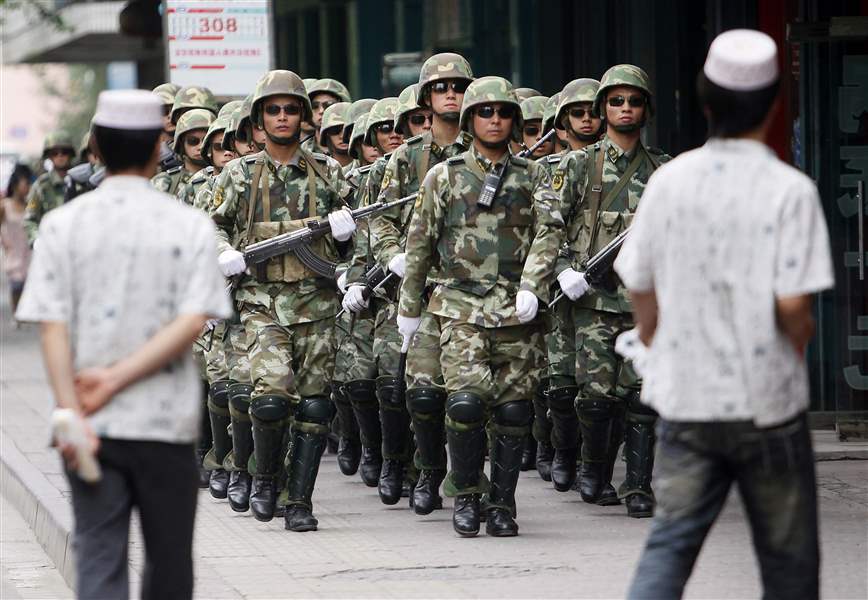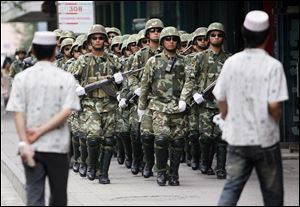
U.N.: 1 million ethnic minority Uighurs in detention in China
9/9/2018

Paramilitary police officers patrol as Uighur men walk by in Urumqi, western China's Xinjiang province, in 2009.
ASSOCIATED PRESS
RECENTLY THE United Nations and the U.S. government have said that an estimated one million ethnic minority Uighur are being held in detention camps in China. While China denies that it operates detention camps, the evidence is overwhelming.
A majority of Uighurs (pronounced Vee-gers) live in the western Chinese region of Xinjiang and profess to the Islamic religion. A separatist movement in the region demanding a homeland has been brutally suppressed by the Chinese government. In Xinjiang, the Chinese government equates practice of religion with terrorism. It is said that in the detention camps the Uighurs are forbidden to practice their religion and, according to some reports, are forced to eat pork and drink alcohol, practices that are strictly prohibited in Islam. There are also reports of widespread torture and even deaths in the detention camps.

Paramilitary police officers patrol as Uighur men walk by in Urumqi, western China's Xinjiang province, in 2009.
Two years ago, the Chinese authorities appointed Chen Quanguo as the head of the Xinjiang region. Mr. Chen had earlier served as the head of the Communist Party in Tibet where he brutally suppressed the Tibetan independence movement and brought the region under the firm control of Beijing. In the process, he earned the confidence of Chinese president Xi Jinping, so he was brought to Xinjiang to control the restive region.
The authorities had, in the past, prevented young Uighur below the age of 18 from attending mosques, had banned unauthorized pilgrimage to the Islamic holy city of Mecca, had ordered Muslim students not to fast during Ramadan, and had banned Muslim women from wearing headscarfs.
These measures were not only reinforced but added on to by the new chief in Xinjiang, where he has banned flowing long beards (deemed abnormal) and the use of certain Muslim names for children. He has also encouraged people to spy on each other and report militants by promising rewards up to 5 million yuan, or $750,000, an amount 200 times the local income.
I witnessed first-hand the blatant intimidation of the Uighurs population in the spring of 2017 during my travels on the Silk Road.
The army would arrive in a town without notice and would clear the streets of all traffic. They would place sharpshooters on rooftops and start military exercises in the streets. No one was allowed on the streets and forbidden to look out the windows.

Dr. S. Amjad Hussain.
In the cities and towns in the Xinjiang region, there are police stations on every block. They are easily recognizable for the constant flashing lights. The police and army vehicles crawl the streets with sirens blaring and lights flashing. There are checkpoints between the cities and towns in Xinjiang where the identity of each person, including foreigners, is checked.
Mr. Chen has opted to use a “scorched earth” policy, where he is determined to eliminate religion from the area under his control by forcing Uighurs to renounce their faith. It seems that the Chinese are determined to throw the baby out with the bath water. In Xinjiang, all the key government positions are held by the Chinese Han and not by the Uighurs.
According to the Wall Street Journal, the scale of internment camps has doubled within the past year. The U.S. Congressional-Executive Commission on China described it as “the largest mass incarceration of a minority population in the world today.” What started out as eradicating extremists among the Uighurs has now turned into a fully orchestrated program against Islam and symbols of Islam.
China denies the existence of internment camps. It refers to them as just vocational schools for criminals.
People in Xinjiang, as in other parts of China, are loath to discuss politics. I tried to engage a few people but they tactfully changed the subject.
With such blatant animosity towards Islam, why has the Muslim and Arab world been totally silent? The answer lies in China’s ambitious plan to invest heavily in the infrastructure of countries in Asia. Its “Belt and Road Initiative,” encompassing 60 countries in Asia and Europe, would cost an estimated $4-8 trillion dollars.
Pakistan is a good example of a place where economic self-interest trumps defense of religious minorities elsewhere in the world. Unlike cartoons of the Prophet Muhammad, which invoked bloody demonstrations in Pakistan (and elsewhere throughout the Muslim world), there have not been any demonstrations against the Chinese repression of Muslim Uighurs.
Ditto for Saudi Arabia. As custodians of Islam’s holiest sites and presumed defenders of the faith, the Saudi rulers have all but sold out to American interests in the Middle East. The plight of Uighurs is just not that important to rattle the kingdom’s benefactors.
S. Amjad Hussain is an emeritus professor of surgery and humanities at the University of Toledo. His column appears every other week in The Blade. Contact him at: aghaji@bex.net.